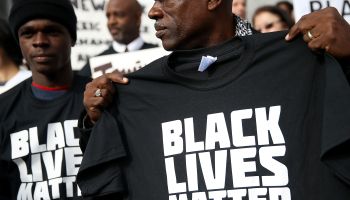Music is a powerful weapon in social justice.
For generations, songs have pushed back on crimes against humanity. Artists like Marvin Gaye, Public Enemy, Common, and Kendrick Lamar have created outlets for the oppressed, unheard, and outraged. In honor of CASSIUS’ latest digital feature, we’ve compiled a soundtrack for social justice, plus a breakdown of some of rap’s most influential tracks on the subject below.
Grandmaster Flash & The Furious Five – “The Message” (1982)
“You’ll grow in the ghetto living second-rate
And your eyes will sing a song called deep hate
The places you play and where you stay
Looks like one great big alleyway.”
Grandmaster Flash & The Furious Five’s “The Message” is often regarded as one of rap’s most important singles of all time. Originally crafted by Duke Bootee and also performed by Melle Mel, the song addressed harsh realities in a way that felt innovative. “That was bananas to me at that time,” Kool G. Rap told Genius last year. “You wasn’t really hearing that kind of hip-hop.” The track almost didn’t happen. “I didn’t think that it would be pivotal either way,” Melle Mel said (via NPR). “I just thought it was gonna be another record.” But by bypassing braggadocious bars for brutal truths about poverty, drugs, and social ills, “The Message” worked as a pivotal protest rap track, which has since inspired a plethora of messages from in and out of the hip-hop community.
N.W.A – “Fuck tha Police” (1888)
“Fuck the police comin’ straight from the underground
A young nigga got it bad ‘cause I’m brown
And not the other color, so police think
They have the authority to kill a minority.”
Thirty years removed, N.W.A’s “Fuck Tha Police” remains relevant. The group channeled frustrations with the Los Angeles Police Department into this Straight Outta Compton standout. The song’s dominant chorus continues to soundtrack police brutality rallies as more tragedies occur. In 2015, N.W.A’s biopic arrived post-Ferguson, and Ice Cube lamented this fact. “What’s sad is that the ‘Fuck Tha Police’ record was actually 400 years late,” he told Rolling Stone. “There’s been a thousand Rodney Kings every year that we don’t hear about. Just now with technology, we’re able to really see these pockets of bullshit that poor people have been dealing with forever. But that shit is still usually done in the dark — and that’s what makes our movie relevant today, and makes N.W.A relevant today.”
Public Enemy – “Fight the Power” (1989)
“What we got to say
Power to the people, no delay
To make everybody see
In order to fight the powers that be.” – Chuck D
Spike Lee once asked Public Enemy to create a protest anthem for 1989’s Do the Right Thing. The group more than delivered with The Bomb Squad-produced “Fight the Power.” Chuck D and Flavor Flav’s strong vocals added to the track’s booming, frenetic production. The song, which references racism, freedom of speech, and more, also appeared on P.E.’s outstanding 1990 album Fear of a Black Planet. Chuck D reflects on the track’s importance in his 2017 book, This Day in Rap and Hip-Hop History. “The anthem, while created for the film,” he explains, “has resonated exponentially throughout society.”
Kendrick Lamar – “Alright” (2015)
“We hate po-po
Wanna kill us dead in the street for sho’
Nigga, I’m at the preacher’s door
My knees gettin’ weak, and my gun might blow
But we gon’ be alright.”
Police fatally shot nearly 1,000 people in 2015, according to the Washington Post. That same year, Kendrick Lamar released his critically heralded album To Pimp a Butterfly. Produced by Pharrell Williams and SounWave, “Alright” stood out as one of the LP’s most potent songs. It also worked as an unofficial Black Lives Matter anthem at police brutality rallies. K-Dot spoke about the song’s impact during a GQ interview with iconic producer Rick Rubin. “There was a lot going on and still, to this day, [there’s] a lot going on,” Lamar said. “I wanted to approach it as uplifting, but aggressive, not playing the victim, but still having that ‘we strong’ [feeling].” Rubin also dubbed it “our generation’s protest song.” He was right.
Common – “Letter to the Free” (2016)
“We ain’t seen as human beings with feelings
Will the U.S. ever be us? Lord willing
For now, we know, the new Jim Crow
They stop, search, and arrest our souls.”
Common’s “Letter to the Free” is one of rap’s most poignant protest anthems in recent years. Produced by Karriem Riggins, the Bilal-assisted cut appeared on Common’s Black America Again and in Ava DuVernay’s The 13th documentary. It’s also moving due to its references to the 13th Amendment, stop and frisk, corruption, and injustice. “Letter to the Free” is also an homage to iconic works that came before it, including Maya Angelou’s “I Know Why the Caged Bird Sings” and Billie Holiday’s “Strange Fruit.” Plus, it works as an anti-Donald Trump track. “We staring in the face of hate again,” Common raps on the song. “The same hate they say will make America great again.”
https://open.spotify.com/user/1212844646/playlist/0F0uCjEaPMKVVSK66MWCWt?si=an9ghr5NTjS8xqwrQM6u5Q

















